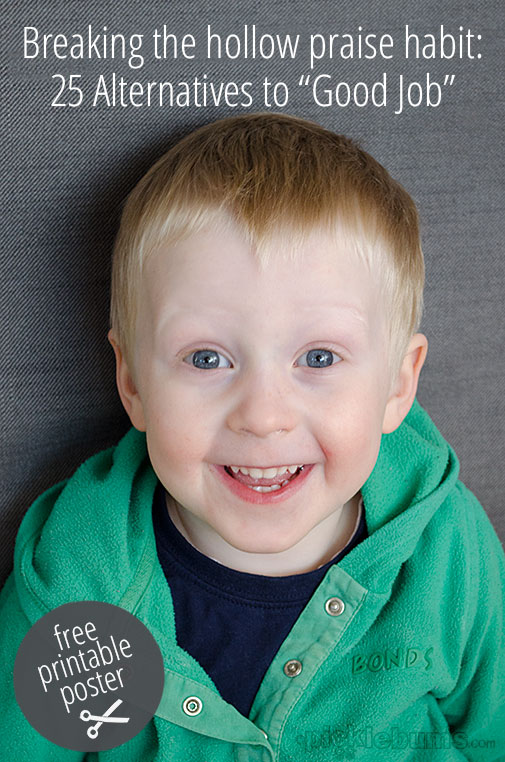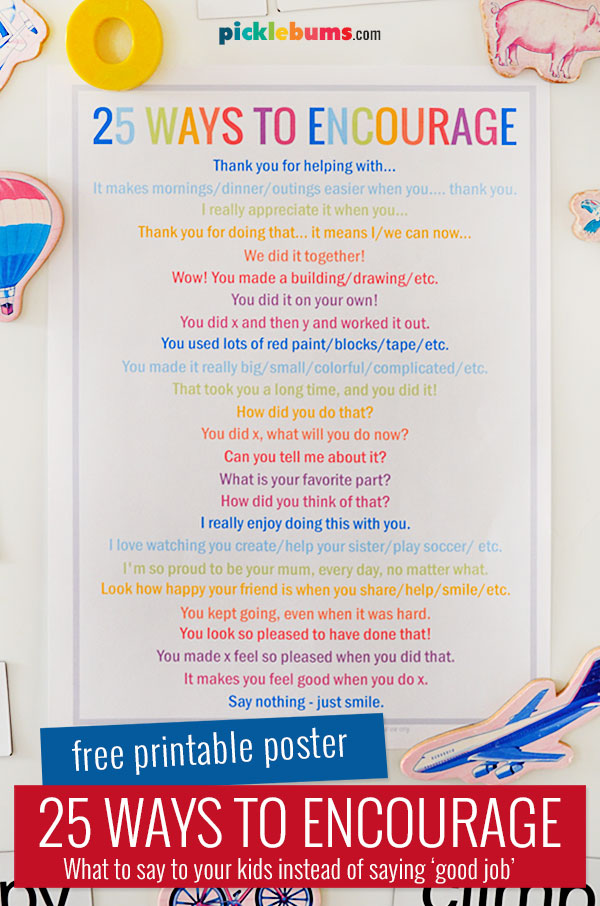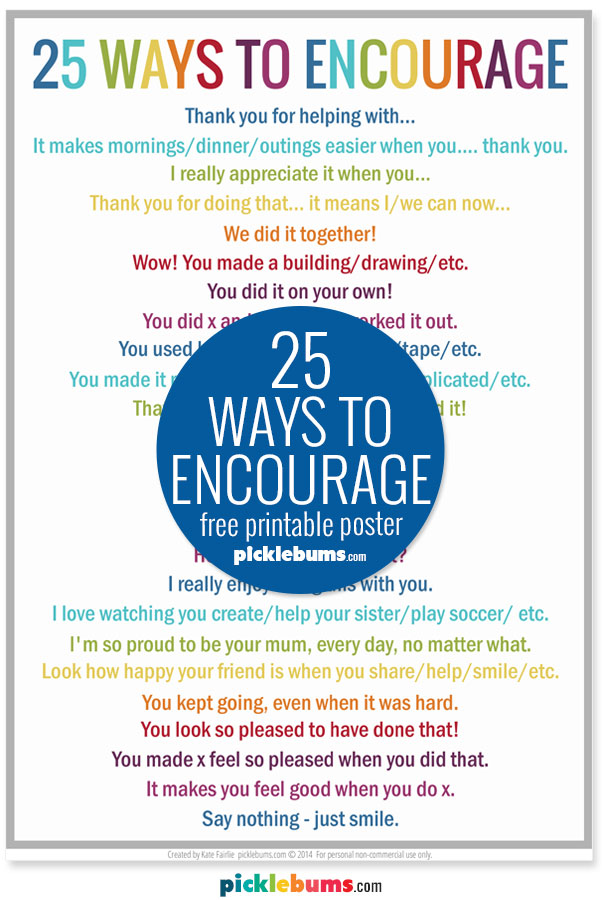If you are trying to break the habit of hollow, unthinking praise, and the habit of manipulative praise, and turn it into something more worthwhile, these 25 alternatives to saying “good job” might help get you on a better parenting path.

Recently I shared some thoughts on praise and manipulation.
In that post I shared some brutal truths about how I parent, and some ideas about how I would like to parent. I shared my goal to break the habit of hollow, unthinking praise, and the habit of manipulative praise, and turn it into something more worthwhile.
But breaking a habit is not easy, so I’m falling back on my tried and true idea and arming myself with some ‘positive first responses‘. I’m hoping that if I’ve already thought about something better to say than “good job” then I will be more likely to remember it and use it when the time comes.
So I’ve put together a list of 25 alternatives to “good job” and given myself some ideas of when to use them.
More parenting inspiration…
What to Say Instead – Alternatives to “Good Job”
Sometimes, when you are on the spot, it can be hard to think of the ‘right’ thing to say. This list of things you can say instead of ‘Good Job” is not perfect, but it might help you get on the right track, and if you have these ideas in the back of your mind, it might help you find the right words in the moment.

- Thank you for helping with…
- It makes mornings/dinner/outings easier when you…. thank you
- I really appreciate it when you…
- Thank you for doing that… it means I/we can now…
- We did it together.
- Wow! You made a building/drawing/etc.
- You did it on your own.
- You did x and then y and worked it out.
- You used lots of red paint/blocks/tape/etc.
- You made it really big/small/colourful/complicated/etc.
- That took you a long time, and you did it!
- How did you do that?
- You did X, what will you do now?
- Can you tell me about it?
- What is your favourite part?
- How did you think of that?
- I really enjoy doing this with you.
- I love watching you create/help your sister/play soccer/ etc.
- I’m so proud to be your mum, every day, no matter what.
- Look how happy your friend is when you share/help/smile/etc.
- You kept going, even when it was hard.
- You look so pleased to have done that!
- You made X feel so pleased when you did that.
- It makes you feel good when you do X.
- Say nothing – just smile.
Changing this habit and taking the time to think of something better to say can be hard, and it does take a little more time and effort, but that is the point. It is next to meaningless if we just let rote praise spew out of our mouths without thinking.
Only say something when you mean it, then you won’t notice the time and effort it takes to tell your child how you feel, how excited, or how thankful you are because it will be genuine.
Free Printable Poster – 25 Ways to Encourage.
It can be hard to break a habit, and when you are in the moment with your kids, it can be even harder to think up something to say. So I made a printable poster with these alternative encouraging phrases, so I can stick it on my fridge and practice a few every time I walk past.
At first they are going to sound a bit stilted and not that genuine, but the more you use them, the more they will become second nature, and the more you will adapt them to be more ‘you’, until you don’t need the list at all, because you’ve broken the habit of hollow praise!
You can download this printable poster of 25 ways to encourage here.
This printable is an A4 sized pdf file, you will need a pdf reader such as adobe acrobat to open it. If you are printing on US ‘letter sized’ paper be sure to select ‘fit’ or ‘shrink to fit’ from your printer options.
Please remember that the printables at picklebums.com are for personal use only, you may not sell, share, or link directly to these files.
Are you working on breaking a not so great parenting habit?
I’d love to hear about your parenting struggles, and your parenting wins!
If you’d like to share, leave a comment below, or feel free to send me an email any time.
This post was originally published in July 2014, and updated in 2020.


My co-worker send me this site with this information about ways to encourage. This goes well with a lesson I teach parents. My curriculum has a long list of appropriate ways to encourage and now I will add yours. Many on the list are in the lesson list already. I’m also going to translate it in Spanish. I love that you share it in a printable format.
What a handy printable!
I love these sort of practical helpers when trying to change habitual behaviour. :)
This is excellent . . . the words we use have a huge and lasting influence on our children’s development. Focusing on the PROCESS of what they have done, are doing, or will do . . . instead of just the OUTCOME . . . teaches them to think about what they are doing, how to plan and think in future situations . . . it enables them not to depend on our APPROVAL for “success” but to appreciate the steps along the way to doing something, even if it doesn’t work! “Good job” really focuses attention only on things that succeed . . . they can still learn and be encouraged, even if the task “fails”
Thanks for putting this together
I’m sure you already know that these phrases are almost all equally good for grownups who were reared without enough social skills – just to use to each other!
This is a very good way for every one to learn how to use other terms than to just say good job.. not just with children but for everyone…. I posted this to my timeline so if i catch myself saying good job I can go to the page and find other ways to say good job but not in them words untill i have “good job” out of my vocabulary.
Im sorry but I think its a load of rubbish. I got ‘good job’ from my parents and it never felt hollow or meaningless. I always felt proud when I heard it.
“Good job!”
Firstly I live these ideas. I had to chuckle at this. I tell my 4 year old good job all the time. Usually prefaced with what he did well. So yesterday I praised my son for whatever he was doing and he replied with : “say good job mom”
Love this resource! I teach a college class on social-emotional competence, and moving away from empty praise is always one of our more challenging topics. I will be sharing this resource with my students, thank you!
Thanks for sharing this. We are always trying to be aware of the words we use with our children. We say “good job” as a joke with our fake American accents but do use feelings and describing words to express something that has been a positive experience. I like the idea of sitting back and just offering a smile as well. I jump in with praise a lot and thus will help us working in subtle emotions more.
There’s an article by Alfie Kohn talking about why one shouldn’t say “good job”.
Hi I tried to have this enlarged and copied at OfficeMax and they tell me they can’t because of copyright. Is here anyway to get this taken care of to be printed?
I have heard of that happening in the US, but I would have thought that unless you are printing loads of copies the fact that it says ‘for personal use’ on the bottom of it would have made it ok?
I am not sure what requirements they have but if you ask them what they need and send me an email via the contact form I’ll try and help you ou. But you won’t be able to enlarge it much without loosing quality, as it was created to be printed A4 size so people could do it at home.
My mom and primary school teachers definitely used all of these phrases. .
I would like to add though that different children might respond differently to these phrases. For example: I used to feel offended when a teacher or my mom asked questions about my drawings or the stories I wrote… I felt like I had apparently done a bad job at expressing something to these people if they wanted me to explain further! I was a perfectionist and feeling like I failed at something a few times discouraged me from trying again.
Luckily I became less overly sensitive to comments/questions/criticism on my work later in life because I learned to understand peoples intentions.
I recently realized I say “Good job” too often. I’ve been working on that but I’m like a deer in the head lights when the moment comes to praise or encourage my son with something new. So your suggestions are helpful, particularly just the idea of making a list and I’m going to make my own . I’m on the fence about about your suggestion to say what you see without emotion. To me that kind of encouragement or praise sounds empty, which is what we’re trying to avoid here. I get excited when my child does well and I don’t want to hold that joy back from myself or him. However, there is a fine line. My son’s grandparents go overboard and exaggerate exuberance for the slightest thing. I’m afraid this will give son a false sense accomplishment or to go through life constantly seeking approval from others. I suppose that is a grandparent’s prerogative but frustrating and confusing for me. Like I said, it’s a fine line, but where is that line?
What I love about his is that you are encouraging moms (and yourself) to not only live in the moment, but really observe what is going on with your children. With our lives being so busy, and our eyes averted by technology, it is easy to simply say mmhmm to our children. We can easily slip into the habit of not really “seeing” what they are doing, “hearing” what they are saying, “enjoying” the fleeting moments of childhood.
I have 5 boys, and have had seasons of life when I do this well, and seasons when I fail, yet it is such a powerful lesson.
See our kids. Acknowledge them. Build them up, but don’t puff them up.
I loved this. That you for sharing!
Thank you for sharing! It is so helpful to have phrases *to* say to fill our vocabularies with positive, encouraging phrases instead of empty phrase! I see your printable says “not for commercial use,” so I wanted to ask if you would mind if I share it as-is (credit and all intact) with the students in the parenting classes I lead? I wouldn’t sell the printable, but the students have already paid for the class, so I wanted to check first :)
I really is helpful to fill up with positive things to say isn’t it!
All my free printables are not available for commercial use, or use by a for profit business. You are able to give the parents in your class a link to visit this post and download the printable themselves but you are not allowed print and distribute the printable as part of your paid class unless you are a non-profit organisation. Thanks for taking the time to ask and for respecting my terms of use :)
No problem; I will direct them to this link :)
With all the research around fixed vs. growth mindset I’ve ready lately, I’ve been consciously trying not to say “good job”. I’ve been trying to focus praise on the work my kiddo puts in, the effort required, rather than the outcome or result. It’s taking a lot of mindfulness to stay in the moment and not just throw out a “good job” because it’s a habit. Not sure if you’ve read the post floating around about the saying “I love watching you…..” fill in the blank. It’s not necessarily about praise, but I’m falling in love with it. When we go to the park, or after a riding lesson, maybe she’s practiced a new skill or not, I love to see the look on her face when I simply say… I love watching you ride a horse. It’s totally true ~ it’s one of the most joyous parts of my week… but how often do we SAY that to someone? It’s not about how well she rode, or how great her sand castle was at the park, or if she won that game of tag… it’s about me loving watching her enjoy her life and the joy I get from it. Anyway… great post and I’m going to write a few of your ideas down so I can hopefully remember them in the moment. :)
I agree. I have read that essay and have found that phrase to be so liberating. It captures exactly the essence of what is important. Thanks for the reminder.
Thanks so much for this. As a parenting counselor I will post this chart in my office. Really well done.
Been saying this for years. Thank you for the concise poster on other things to say. Great info
I may be quoting you in a blog.
I have been attempting to impart these ideas about praise (shifting from empty praise to more meaningful praise) to the families in my toddler art classes for years. The printable will ne a great resource for synthesizing it all! My two cents after years of observation of hundreds of well-intentioned parents/grandparents/nannies is that the “say nothing” option should perhaps be moved to the top of the list. The constant cheerleading seems to me to deter sustained focus and effort and intrinsic motivation in and of itself when overdone. By acting as if we constantly have to affirm oir childrens efforts i think we inadvertently undermine their confidence and self esteem.